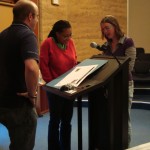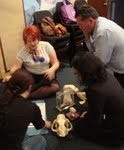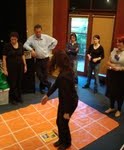Communicating Climate Change workshops: The last two of a three workshop series in Communicating Climate Change were held in Sydney. ASC, Sydney Environmental Educators Network (SEEN) and International Association for Public Participation Australasia (IAP2) collaborated to put on this series. The events were of high quality and well received. The main attendees were from sustainability and adapting to climate change departments in local councils. Overall numbers were below expectations but we broke even. It may be worth making the workshops a full day each, repeating the series in another city and seek to broaden the appeal to attract a larger and more diverse audience.
Member’s comments about the Inspiring Australia report: I finally got around to editing Rob Morrison’s report of member’s comments and his analysis. As I mention in a separate article this document is worth a read, especially the first 6 pages if you are short of time. The document covers much ground and offers many suggestions for action.
Science communication services to science organisations: In late August I asked you to nominate services which science communication companies can offer to science research organisations. I collated your excellent replies and have posted them to the website. I hope the list proves useful and will be added to in the future.
National Science Week – been and gone: I had time to attend only a few National Science Week (NSWk) events in Sydney but enjoyed every one of them. The official launch of NSWk was at the Botanic Gardens and offered a good opportunity to talk to key players in NSWk and the Inspiring Australia report. Phil Dooley, chair of the NSW ASC branch, presented an exciting science talk with demonstrations to around 250 people at the Powerhouse Museum. I believe many ASC members were busy delivering science engagement activities this year. Post an article to the ASC website if you had a significant science engagement experience during NSWk.
Eureka Awards big night: renewed funding and review of science prizes: It is good to hear that DIISR will continue to support at least three of the Eureka Awards. Please see my article requesting information about other science award programs that have science communication as a criterion.
Young Tall Poppy Awards: I attended the Young Tall Poppy awards event in NSW and then met with Elektra Spathopoulos, Executive Director of the Australian Institute of Policy and Science and the Tall Poppy Campaign. We discussed how our organisations can assist one another especially as the Tall Poppy science awards has science communication as a key criterion. Elektra was interested in the improvisational theatre training workshops I’ve been trying to get going. Much more needs to be done to make this happen.
2012 National Conference Planning Committee: I had a great response to my invitation for members to join the planning committee for our 2012 National conference. I’ll announce the people selected in late November. Much thanks to those who put up their hands.
Networking in NSW: Going by invitations to events and exchange of information I see an increasing appreciation of the ASC by the NSW Office of Science and Medical Research (OSMR) and its parent department. It takes time to make connections and then maintain them but is worth it for the potential support we stand to gain. I know that our branches are developing or building on connections with their state and territory governments and chief scientists.
ASC-AAEE professional development workshops: The proposed workshops in collaboration with the Australian Association of Environmental Education have fallen into the ‘much needs to happen’ category although the Sydney Climate Change workshops have provided a useful learning experience. I still think this is something we can look forward to happening.
What is science?: Great idea for an ASC project but I need to write a brief to get this started with Rob Morrison’s help. I spoke with the Executive Officer & Editor of the Australian Skeptics and he says that this may be something we can work together on.
Membership renewals: Please renew your membership if you haven’t already done so. We have a pretty good renewal response and we will send final reminders to those still to renew.
Jesse Shore
National President



